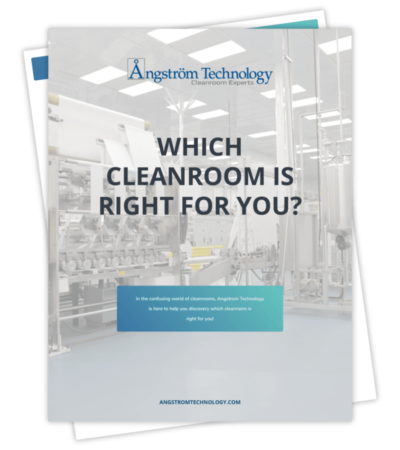AIR FILTRATION
LAMINAR AIR FLOW
Your cleanroom filtration system is the most integral part of your cleanroom, no matter if it’s a SoftWall, HardWall, or RigidWall cleanroom. The filtration system is essentially what keeps your cleanroom clean. Working in conjunction with laminar air flow, multiple filters take out the amount of particles you need to meet your cleanroom standards. Laminar, or unidirectional, air flow, is a way of making sure that air flows in only one direction, lessening the possibility of particles getting kicked around and landing in your cleanroom. In most cleanrooms, air is directed from the top of the room to the bottom, ensuring any contaminating particles are pushed out, and don’t have time to land in places they’re not supposed to. Laminar air flow pushes air through the filters that remove it of particles. As air goes through filters, particles get stuck to the tiny, randomly placed fibers within the filter, and are thus removed from the air entering your cleanroom.
WHAT TYPE OF FILTERS ARE THERE, AND WHAT DO THEY DO?
There are all kinds of filters, and at Angstrom, we offer every kind of filter in a size that will fit your cleanroom needs. We have motorized, HEPA and pre-filters that we can customize to suit your cleanroom. Here are the three basic cleanroom filters:
PRE-FILTERS
The first step in filtering/removing large particles.
ULPA FILTERS
Can remove 99.999% of particles 0.12µm or larger.
HEPA FILTERS
Can remove 99.999% of particles 0.3µm or larger.
PRE-FILTERS
As their name suggests, these types of filters are responsible for filtering out the particulate in air before it gets to the HEPA or ULPA filters. Generally, these remove larger particles. Using pre-filters is also a great way to extend the life of your HEPA filters, as it makes the HEPA filter work less. If your filtration system has pre-filters, it’s good practice to change them about 6 times a year, or every other month. This will keep everything in your filtration system running smoothly, and will ensure that none of the cleanroom system parts past the pre-filters experience excessive contamination.
ULPA FILTERS
Ultra Low Particulate Air filters function similarly to HEPA filters, but are even more efficient. Specifically, ULPA filters are rated to remove 99.999% of all contaminants larger than 0.12µm in diameter. Since ULPA filters function similarly to HEPA filters, the maintenance and replacement processes are largely the same. The real difference is that ULPA filters are generally much more expensive than HEPA filters, making your maintenance plan all the more important. So, make sure you schedule regular maintenance and keep up on leak testing and leak repair.
HEPA FILTERS
Standing for High-Efficiency Particulate Air, these filters are noted to filter out 99.99% of particles 0.3µm or larger. Perhaps the most popular option, these filters – when maintained properly, and in the right environment – can last upwards of 7 years before they have to be replaced. There is no set amount of time in which you should replace your filter. We recommend instead, that you inspect your HEPA filter, and recognize the signs that point to a leak, or the potential for repair. Since every factor in your cleanroom can affect filters differently, it’s hard to give a specific time frame for HEPA filter replacement. The temperature, humidity, and air pressure levels all factor into your HEPA filter’s lifetime. So, it’s important that you have your filter leak tested at least once every two years. If significant leaks are found, sometimes they can be repaired, or you may have to replace the filter altogether. The best thing to do is to make sure your filters are maintained properly, in order to ensure the maximum lifetime for your HEPA filter.
GET INSTANT ACCESS TO OUR CLEANROOM DESIGN GUIDE
THE MOST COMPREHENSIVE GUIDE FOR CLEANROOMS AND MODULAR OFFICES

